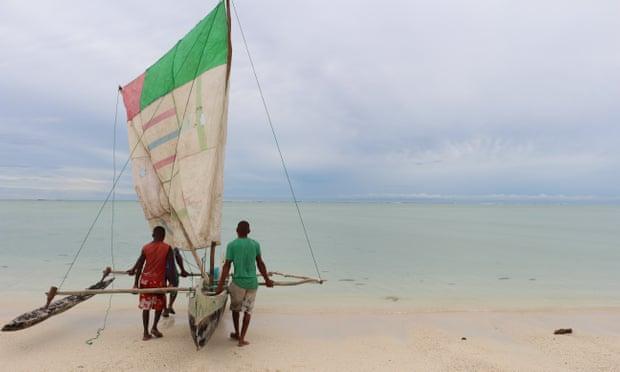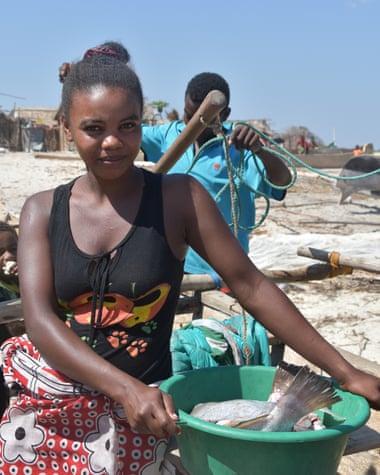How the Fishermen of Madagascar Are Pulling Together to Combat Climate Change
By joining local co-operatives, fishing communities in the island nation are being taught good fishing practices, with benefits to their livelihoods and the environment
Originally posted in The Guardian
Fishermen in Madagascar spend several hours a day on their pirogues (fishing canoes) out at sea. In the past, they would return home with baskets brimming with fish. But today, catch sizes have dwindled due to overfishing, rising sea temperatures and extreme weather. In order to help them preserve their livelihoods and slow the effects of climate change, Swiss social enterprise Weconnex is teaching sustainable fishing techniques while supporting access to markets.
In recent years, rising water temperatures around Madagascar have caused coral bleaching and destroyed the natural habitat of various marine species. Extreme weather conditions have limited the days fishermen can go out on their small pirogues. Countrywide droughts make land-based agriculture more difficult and have triggered migration to coastal areas as fish become the single source of food and income, fuelling socioeconomic tension between newcomers and long-term residents. Overfishing by industrial companies backed by the government has also intensified.
In the face of all these challenges, local fishermen had developed a harmful practice of keeping everything they catch, without returning smaller fish and other inedible marine life to maintain the balance of the ocean’s ecosystem. As a result, they were at risk of fishing their livelihoods away unless drastic action was urgently taken.
Integrated approaches
Attempts by NGOs to tackle these issues by regulating fishing activities have not achieved the desired results, due in a large part to a lack of government regulation. At the same time, the fisheries and aquaculture in Madagascar make up more than 7% of the GDP, and around 2 million inhabitants depend on small-scale fisheries for food and income. If the marine resources continue to be exploited, it raises the question of how this island nation’s population will earn a living and feed their families in the future.
Weconnex saw a gap in the market in terms of educating fishermen on sustainable fishing practices while also improving their profits. Taking a holistic, market-oriented approach, local infrastructure hubs called Nexus Centres were set up to provide core infrastructure for the whole fishery value chain. This ranged from equipment to improve the quality of the catch to how it is transported to market, as well as a hub where fishermen can improve their fishing skills through training. For example, fishermen have been taught to pack the fish on ice at sea to keep it fresh, so its value does not decrease immediately after the catch. Weconnex also helps organise the fishermen into co-operatives, where they become shareholders of Nexus, which operates the centres. This company oversees the logistics of getting fish to market, as well as sales at market. Thanks to better quality and regulated quantities, improved prices can be negotiated. This integrated value chain stabilises and increases fishermen’s income in the long term and it allows the sustainable development and operation of rural infrastructure.
At the same time, Weconnex has partnered with NGOs to draw on their knowledge of nature conservation and to ensure this is integrated into the good fishing practices that co-operative members learn through the centre. For the first time, these NGOs have a market-based lever to enforce guidelines for sustainable fishing: only fishermen who comply with the guidelines are granted access to co-operatives. The Nexus Centres not only offer infrastructure, but also training and know-how for sustainable fishing practices.
Inclusive business model creates the right incentives
What stands out compared to other concepts is the co-ownership: 49% of the Nexus company belongs to the local fishermen; the other 51% belongs to its investors. The company aligns everyone’s goals and makes sure all the involved parties strive for the success of the project. Most importantly, the model ensures that locals are recipients of economic success along the value chain.
Nexus opens perspectives for the rural population. The model is not limited to fisheries. In the medium-term, the co-operative will develop alternative sources of income. In south-western Madagascar, for example, aquaculture or agroforestry are being evaluated.
Shifting power to communities
The approach not only implements a model that fosters economic inclusiveness, but it also shifts power to the local producers. By organising fishermen in a co-operative, they can speak with one voice and play a role in political discussions.
The aim is to build an ecosystem in which everyone is better off. Fishermen should be able to stabilise and increase their income. Additional jobs and alternative income sources are being created within the communities. Fish stock should be stabilised thanks to better know-how and a market-based lever to enforce guidelines. Investors are linked directly with local producers and have a direct impact on conservation, sustainable rural development and climate change adaptation.
Adrian Rutishauser is a project manager at WeConnex AG.
Weconnex also implements the Nexus concept in Nepal and Indonesia. Find out more


